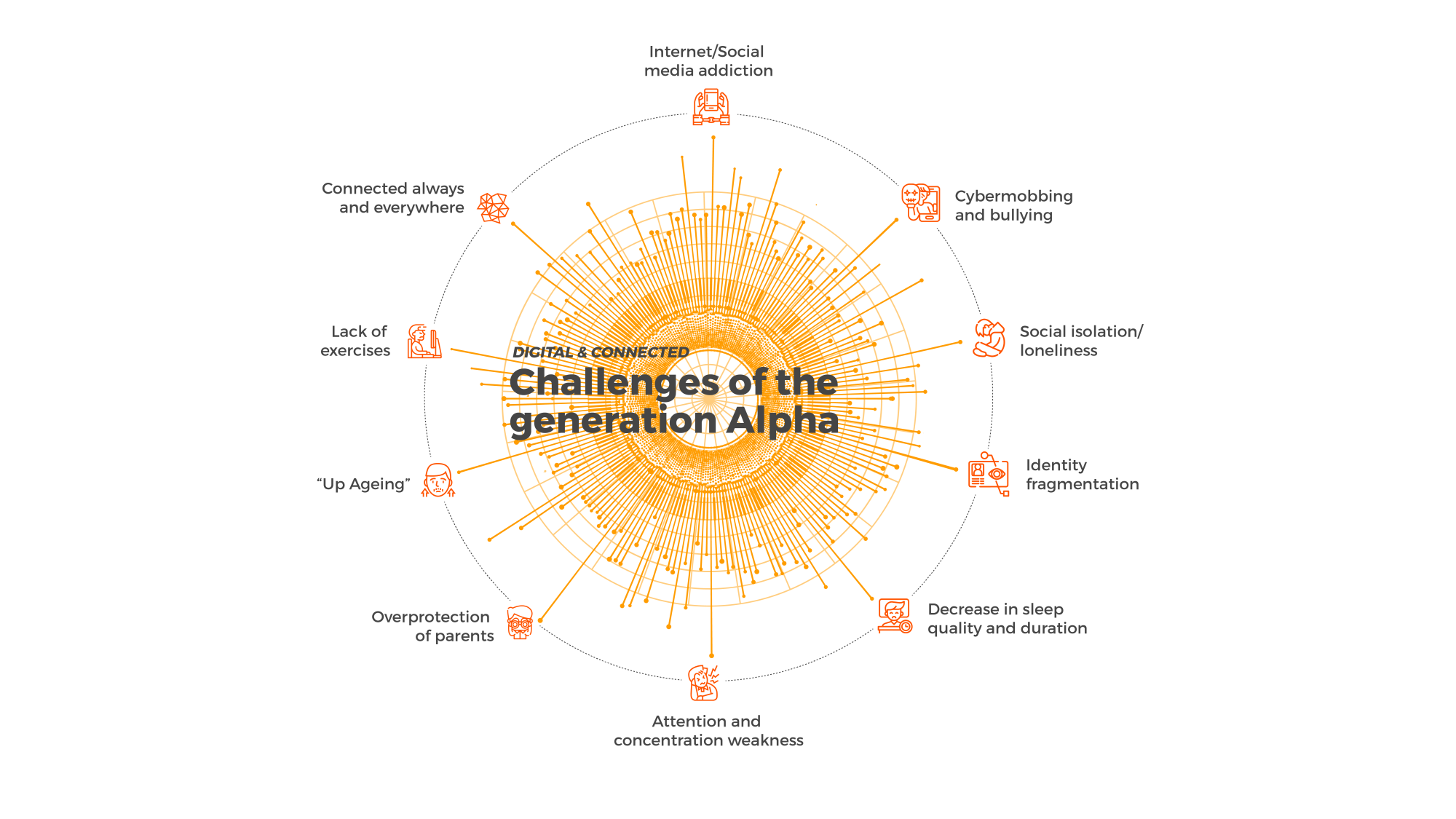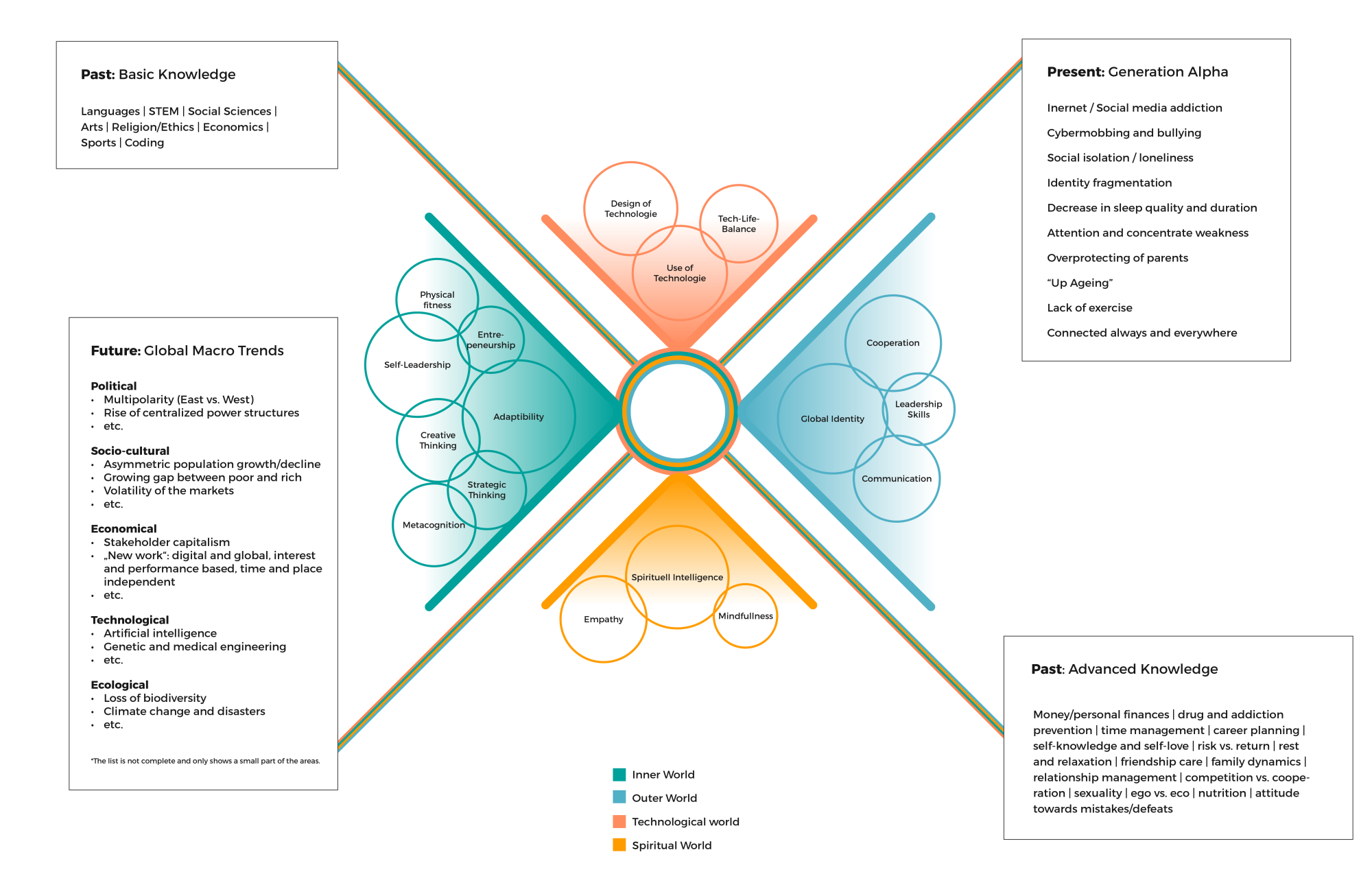Past.

Mankind is fervently dedicated to the pursuit of education and has the necessary infrastructure to teach a seemingly infinite range of subjects. We educate mathematicians, teach the intricacies of rocket science, and explain the conductive properties of metal alloys. However, it is remarkable how selective we are in choosing the subjects we teach our children in school. We focus primarily on material, scientific, and technical subjects, neglecting psychological and emotional ones. Much thought is given to the mathematical abilities of future generations, but little to their abilities in social interaction, emotional intelligence, or relationships. We devote countless hours to the study of chemistry, but comparatively little time to understanding shame or interpersonal conflict.
We are advanced in our understanding of machines and technology, but naive in dealing with our feelings. We have the technology of an advanced civilization, but our emotional, spiritual development has stagnated since our days in the caves. Ironically, the teachings of the Stoics are still among the bestsellers, but the scientific achievements of that time have long been forgotten.
Today we are confronted with the destructive impulses of primitive primates equipped with thermonuclear weapons.
This paradox of progress is one of the main reasons why many of us, despite having gone to school most of our lives, feel illiterate after graduation. After school, we live life as if we were never taught how to live it. We run after money without being able to define what money is, how much money is needed, and how to prudently save or think critically about costs and taxes. How can we study for decades and still graduate without having a comprehensive knowledge of our own emotions, our gender, our relationships with others, our well-being, our mindfulness, our work life, or even our online-offline life balance? These are just a few examples of areas of knowledge that we neglect.
What is certain is that in order to better prepare children for life, there are topics that should be emphasized in the school curriculum, those which human societies have known about for thousands of years and that would benefit each and every one of us significantly. To cite just a few topics as examples, we have created a list of these life skills below:

Financial literacy
Teaching children about money, budgeting, saving, and investing can help them make informed financial decisions and become financially independent.
Emotional and social intelligence
Teaching children how to understand and manage their emotions and how to interact effectively with others can help them navigate the challenges of relationships and build strong bonds with others.
Mindfulness and self-awareness
Teaching children mindfulness and self-awareness can help them be more present in the moment, manage stress and anxiety, develop a better understanding of themselves, and pave the way to well-being.
Ethics and morals
Giving children the tools to think critically about ethical and moral issues can help them make responsible choices and act with integrity in their personal and professional lives.
Mental and physical well-being
Teaching children about mental and physical health can help them develop healthy habits that will benefit them throughout their lives.
Environmental and community awareness
Teaching children about the environment and their role as responsible global citizens can help them become environmentally aware and develop an understanding of their impact on the ecological communities around them.
Cultural awareness
Teaching children about different cultures and their customs can help them appreciate diversity and become more tolerant of others.
Spirituality
Teaching children about different spiritual and religious beliefs can help them understand and appreciate different ways of life and find meaning and fulfillment in their own lives.

From dealing with money to friendship, nutrition, and addiction prevention. Practical topics of life in school!
Present.
If we look back at history, there are eras in which society as a whole changed. We give them names: the Reformation, the Enlightenment, the Industrial Revolution, Postmodernism, and now, in the age of Generation Alpha, Digital Transformation. Alphas are the first generation born into the digital age of smartphones, social media, and streaming services. They learn to scroll even before they can talk. On average, 75 percent of 10-year-old children already own a smartphone. Globally, preschoolers spend an average of 14 hours per week using digital devices.
(Excessive) smartphone consumption at a young age is the harbinger of many new challenges:

Top 10 challenges of Generation Alpha
1. Internet & social media addiction
Due to so-called ‘addictive design’, IT companies are currently fighting for the attention of our children. Symptoms of internet addiction include loss of self-control, withdrawal symptoms, irritability, restlessness, and nervousness.
2. Cyberbullying
In our survey, a quarter of students reported that they have experienced bullying perpetrated digitally through social media, text messages, or emails. [3]
3. Social isolation / loneliness
Two-thirds of educators (67 percent) and nearly half of parents (49 percent) believe that loneliness is a significant challenge for students today. [4] In the digital age, the child is generally not interacting with anyone physically. If this happens over too long a period of time, the ability to communicate and interact suffers. [5]
4. Identity fragmentation
Personal identity is our concept of self. Social identity describes the positioning we occupy in a social order. For Alphas, a third form of identity is becoming increasingly important: digital identity. [6] The discrepancies this creates between identities can stress Alphas and, in extreme cases, lead to deep self-dissatisfaction. [7]
5. Decrease in sleep quality and quantity
The mere existence of the smartphone can disrupt sleep, according to studies, and looking at the computer or tablet before bedtime keeps children awake for hours which, in turn, leads to greater subjective stress teachers have long registered in the classroom (72 percent). [8]
6. Attention and concentration deficits
Tiktok and Instagram reels, advertising slogans and casual, fragmented WhatsApp communication: Alphas are growing up in a fast-paced ‘chunk’ media and communication culture.
7. Overprotection of parents
About 15 percent of parents overprotect their children to the point that they later exhibit low frustration tolerance and resilience. [9]
8. Up-aging
Nearly nine out of ten parents (87 percent) and educators (90 percent) are concerned that children are being exposed to pornography, drug use, and violence too early through the media.
9. Lack of exercise
About one in five elementary school children in Germany in 2021 was overweight. The numbers have increased many times over since the introduction of smartphones. [10]
10. Always and everywhere connected
The digital nature of their communication reflects a generation connected across social, geographic and demographic boundaries. In the digitally connected world, Alphas never rest and live in a continuous exchange with a global plurality of perspectives, lifestyles, and value systems.


Future.

What kind of world is it in which we are releasing our students? We started our own comprehensive research based on institutions, such as the World Economics Forum (ZIT), the OECD, or, to take a global perspective, the Center for Asian Studies (ZIT), as well as global companies such as Roland Berger and McKinsey. Our goal was to broaden the view and include international perspectives on the world of the 21st century. In collaboration with futurologists such as Norbert Hillinger, we identified 50 macro trends. We immersed ourselves in each of these possible developments in order to describe the dangers/opportunities they entail, using the entrepreneurial STEEP model,
In the 21st century, humanity faces major challenges on the societal (e.g., mass migration and urbanization), economic (e.g., de-globalization), political (e.g., the erosion of democracy and populist movements), technological (e.g., the rise of AI), and environmental (climate change; loss of biodiversity) levels.
In order to live a fulfilling life against this backdrop, our children must be able to develop competencies that serve as a guardrail for personal and societal well-being.
20+ Experts • 100+ Studies • 10+ Surveys • 30+ Observations
After our extensive research of the past, present and future, the following learning framework of basic knowledge, core competencies, and expanded knowledge for the 21st century has emerged:


